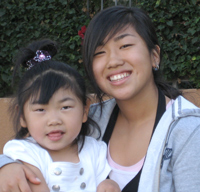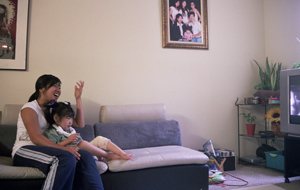My 5-year-old sister Natalie is a rebellious little girl who doesn’t do what she’s told. She’s like a copy of me, the family black sheep, except she has cerebral palsy. It’s been hard to watch her wince in pain while doing physical therapy and get frustrated because she wasn’t able to feed herself. And though I still wish she could walk and talk like other kids her age and do things independently, over time I’ve learned that there’s so much more to my lil’ sis than her disability. She’s such a crack up that I can never be sad when I see her, and I wouldn’t want to change that.
When my parents brought Natalie home I knew she would take my place as the “baby of the house.” I didn’t like that I would have to grow up and be the older sister. But when Natalie was seven months old, my mom noticed that her baby wasn’t crawling or sitting. After a few months of tests we found out Natalie had cerebral palsy, a type of brain damage usually caused by lack of oxygen before or during birth. According to the doctors, Natalie would not be able to walk, talk or sit up straight unless she received proper physical therapy, and even then her motor skills, such as walking, probably wouldn’t be perfect. She was going to be one of the people who others made fun of because they sat in wheelchairs or just weren’t normal.
After Natalie was diagnosed, I would see my mom crying uncontrollably and praying. The mom who I expected to fix everything was falling apart. My dad’s face was expressionless when we told him about Natalie. Even he, who could still give me piggyback rides when I was 9, was unable to fix this.
If God knew everything, could fix anything, why did he make Natalie like this? My family prayed faithfully and went to church, but I felt like God wasn’t there. When I stared at Natalie she looked back at me confused about everyone crying. Natalie didn’t even know she was handicapped. I prayed to God almost every night, along with my sisters and mom, that He would heal Natalie’s cerebral palsy.
Of course He didn’t. But that’s not what’s important to me anymore. I have new prayers. I ask God to make sure that Natalie will realize she doesn’t have to be like other people, even if she’s disabled as an adult.
On a typical day when I come home from school I can hear Natalie laughing even before I open the door. Usually, she’s watching her favorite movie of that week or month. While we were watching Cinderella a few months ago my mom told me that Natalie sassed her physical therapist, who was trying to help her sit, crawl and walk, by pretending to sleep while flashing a mocking smile. Natalie never does anything she doesn’t want to do and gets even lazier when it’s difficult. After my mom told me this, I playfully scolded Natalie.
“Why are you so lazy?! Don’t do that, OK?” She pretended to take it seriously and cried. Then my mom yelled at me for making Natalie cry, even though I knew they were fake tears. After a few seconds, Natalie stopped and stuck her tongue out at me.
Later, we were sitting on the couch and I switched Cinderella to my Korean sitcom. I should have gotten a chance to watch my show since she’s watched Cinderella a gazillion times. But Natalie squeezed her eyes for drops of fake tears and I got blamed for it.
“What’d you do?” my mom asked.
“I didn’t do anything!” I yelled, but my words were no use against my sister’s crying.
“Who did it Natalie?” asked my mom in a joking, high-pitched voice. She knew the tears were fake. “Who did it? Did Jisu do it? I should spank her, huh?”
Natalie stopped crying and nodded with a pouting face. Then, my mom changed the TV back to Cinderella dancing with her stupid prince. I have to admit, I admire Natalie’s fake crying skills, just a bit.
She’s stubborn and spunky—just like me
Ever since Natalie was born, my family would point out how she resembled me, how she would cry aggressively like I did and pulled everyone’s hair to say she was hungry. As Natalie’s personality developed more similarities to mine, my mom would notice and ask in a joking accusation, “Who’d you get that from? You got that from Jisu, huh?” Then, she’d tell my sisters and they’d all laugh.
My mom’s comments that Natalie was just like me made me believe I was seeing myself as a baby. She was starting to look like me, too. We would compare baby pictures of me crying and Natalie’s crying pictures and undeniably, our expressions were alike. My family thought our resemblance was cute, but I didn’t. Who likes to see themselves when they look at their sibling? But now, I feel as though that resemblance brings us closer together.
For the past year and a half I’ve tried to keep most Saturdays free so I can spend time with Natalie. While watching TV early Saturday mornings Natalie smiles and turns to laugh at the TV. I can’t help but smile. She gently scratches my face to get my attention and calls out “mama,” baby language in Korean for food. Seeing that I’m ignoring her, she starts to hit my face harder, but it doesn’t hurt.
“You want mama?” I ask, and she quickly nods her head. I sit Natalie on her high chair and set out a banana, cereal, chocolate milk, toast and jam. “Which one?” I’ll ask her and she’ll point to what she feels like eating. I’ll feed her for an hour or so because she has difficulty chewing. I pick up pieces of food that drool out of her mouth and tell her to follow my example and chew her food in the back of her mouth. While she eats, she watches TV and laughs out loud constantly. She makes me smile as I clean what drops out of her mouth when she laughs.
What started out as something I did mostly to help my mom has changed into something I do because I want to. I do it because I get to know her. One day I’ll see that she’s becoming a girly-girl who likes make-up and everything pink. Also, Natalie thinks she’s a queen who needs her food tasted before she eats it. Let’s say my mom prepares a new kind of fish that Natalie has never seen before. When my mom brings her chopstick that’s holding the best part of the fish toward Natalie’s face, Natalie shuts her mouth and shakes her head at the chopsticks. I sit down and immediately dig in, trying to get the juiciest part before my older sisters come and devour the rest. After my first bite of fish, Natalie starts whining to my mom.
“What is it? What do you want?” my mom asks. Then, with a devilish smile my sister points to the fish. She won’t eat a new kind of food unless I eat it first (and I don’t die).
Sometimes I get annoyed with the way other people react to Natalie. Of course there’s the staring, but she also gets lots of “ewww”s from kids her age because she drools. When she first started going to the elementary level class at church, Natalie was nervous and scared. Every time I said I’d be leaving, she’d grab my hand or leg. Sometimes, she’d even cry. She wouldn’t let me leave her side so I stayed with her. While I was there, I would sense eyes, even little ones, staring from all directions. But I’m proud Natalie’s so bold because now, she tells us to go away after we drop her off.
About a year ago, a 2-year-old girl said, “Hi, baby,” to Natalie although Natalie was two years older than her. After observing Natalie with curious eyes, the girl asked me, “Why is she like that?” I forced myself to say, “She’s sick,” and put a nice, fake smile on my face. It wasn’t her fault Natalie wasn’t normal; I couldn’t take it out on a 2-year-old.
It’s not like I’ve always been the model of how to act toward people with disabilities. Last year I was asked to interview a student in the special education class for my school’s yearbook. I felt a responsibility that I should have met him sooner. I should have more interest in students who face similar difficulties as Natalie, because I’ve seen what she goes through. My friend, Ellen, and I interviewed a boy named Kris about the clubs and activities he participated in. He started to blush as he told us that he played basketball and was part of an environmental and animal club. It wasn’t everyday that the students in the special education class were included in the yearbook or approached by attractive girls.
I’m not asking people to force themselves to hang out with students in special education all the time. Rather, people could get to know them, like the classmates who you talk to in class. It doesn’t hurt to be friendly and see the person behind the differences.
Natalie has brought my family closer together
Last year, my family and I were invited to go to a hot spring in Palm Springs with a church group. The group was made up of people with disabilities who were mostly adults. One woman, who was in her 40s, was so sweet when she played with Natalie and told us to eat snacks she bought just for us. The adults with disabilities only talked of good things happening in their lives: how families were solving problems, how God was helping them and who they needed to pray for.
I noticed that my sister was like them. She smiles no matter what and laughs without care. Everything troublesome goes away when I’m with her.
Since Natalie came along I feel like my family has become more vibrant. The year she was born, we went to Disneyland for the first time. Before if the whole family fought, we would go our separate ways. Now, Natalie’s the peacekeeper, who will always laugh and entertain us. Because when we make Natalie smile, I think it makes us all happy. We also go to the park to play more often. One time my mom and dad started racing laps. They came back huffing and puffing while Natalie and I were on the swings.
“You know, if it wasn’t for Natalie,” my mom started saying, “we wouldn’t be here. Look at us, we’re over 40 and we’re playing in a park like we’re still in our 20s.”
At first I didn’t notice the changes Natalie had made in my life. But I’m really glad God used her to change me. I don’t know if that’s conceited, thinking someone was born for your sake, but I think she was.
“I feel like I don’t know you,” my mom says now. She says she misses the immature, little tantrum-thrower I used to be. Sometimes I wonder if that’s because of Natalie. When we talk about old times, my mom teases me. I’ve grown more independent since Natalie’s birth, not idolizing my mom anymore. I guess she misses how I used to adore and depend on her so much.
Everything my sister is, like being feisty, overshadows her disability. At first it hit me hard, thinking that she was going to have a miserable life. But after spending every day with her for the past five years, I realize that she’s not my disabled sister, she’s just my sister.

